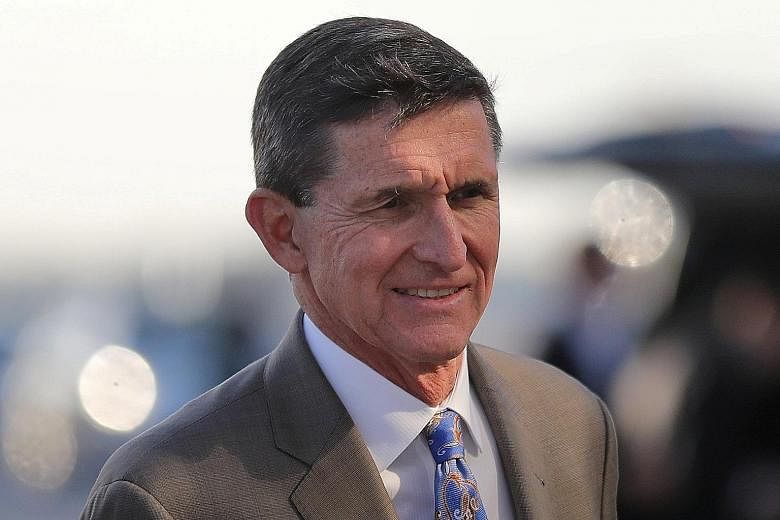WASHINGTON • White House National Security Adviser Michael Flynn resigned on Monday amid a snowballing controversy over whether he had lied about his contact with a Russian official, throwing US President Donald Trump's security team into turmoil just weeks into his term.
Mr Flynn's resignation came as Mr Trump struggles to cement his national security apparatus as the President and his Cabinet officials are preparing for a series of meetings and summits with foreign leaders in the coming months, starting this week in Europe.
Retired army lieutenant-general Keith Kellogg, who had been Mr Flynn's chief of staff, was named acting national security adviser. Along with Mr Kellogg, the White House is considering retired vice-admiral Robert Harward and former CIA director David Petraeus as permanent replacements for Mr Flynn.
None of the three has a history with the President like Mr Flynn, who was an early supporter and ardent campaigner during Mr Trump's improbable campaign for the White House.
Mr Harward has become the front runner, two officials confirmed to The Washington Post. Vice-President Mike Pence has been leading the discussions and has been working closely with Defence Secretary James Mattis, Homeland Security Secretary John Kelly, CIA director Mike Pompeo, White House senior adviser Jared Kushner, chief strategist Steve Bannon and chief of staff Reince Priebus.
Mr Harward served under Mr Mattis while he was at US Central Command and remains an ally and friend of the Defence Secretary.
The White House said late on Monday that Mr Trump had accepted Mr Flynn's resignation amid allegations that the retired three-star general had discussed US sanctions strategy with Russian ambassador Sergey Kislyak before taking office.
Mr Flynn, who once headed US military intelligence, admitted that he "inadvertently briefed" Mr Pence with "incomplete information" about his calls with Mr Kislyak. Mr Pence had publicly defended Mr Flynn, saying that he did not discuss sanctions, putting his own credibility into question.
"Regarding my phone calls with the Russian ambassador, I have sincerely apologised to the President and the Vice-President, and they have accepted my apology," read Mr Flynn's letter, a copy of which was released by the White House.
Such a resignation so early in a US administration is unprecedented, and comes after details of Mr Flynn's calls with the Russian envoy were made public, increasing pressure on Mr Trump to take action.
US media reported on Monday that the Justice Department had warned the White House that Mr Flynn had misled senior administration officials about the contents of his talks with Mr Kislyak, and that it could make him vulnerable to Russian blackmail.
Questions will now be raised about who knew about the calls, and why Mr Trump did not move earlier to replace Mr Flynn. His resignation will also fuel calls for an independent investigation into Russia's influence during the 2016 US presidential election.
Yesterday, Russian lawmakers reacted with dismay and anger, calling the resignation a sign that Mr Trump's White House is driven by the same "paranoia" towards the Kremlin as previous presidencies.
Kremlin spokesman Dmitry Peskov refused to comment, telling reporters during a conference call yesterday that Mr Flynn's departure is an "internal matter" for the US. Mr Peskov said last Friday that reports that Mr Flynn and Mr Kislyak had discussed US sanctions against Russia late last year were not true.
The resignation adds to emerging doubts about Mr Trump among Russian officials after initial euphoria that his presidency would herald a new era in ties with the US following years of confrontation with former president Barack Obama. His administration had introduced sanctions over Moscow's annexation of Ukraine's Crimea in 2014.
BLOOMBERG, AGENCE FRANCE-PRESSE, WASHINGTON POST

